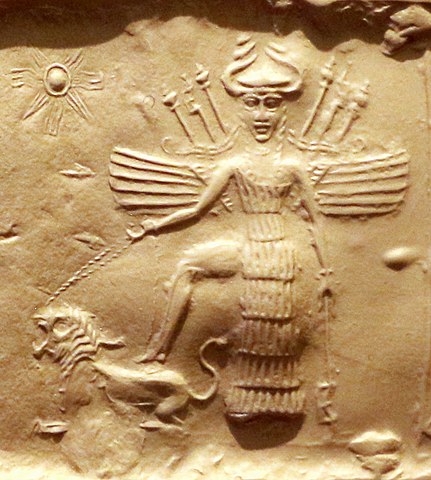Difference between revisions of "Template:Occult.live:Today's featured article"
Occultwiki (talk | contribs) |
Occultwiki (talk | contribs) |
||
| (28 intermediate revisions by the same user not shown) | |||
| Line 1: | Line 1: | ||
[[File: | [[File:Ishtar Akkadian seal.jpg|250px|left]] | ||
'''[[ | '''[[Ishtar]]''' is the ancient goddess of love, war, and fertility worshipped in the Akkadian Empire, by the Babylonians, and Assyrians. She was originally worshipped in Sumer as Inanna. She is also associated with beauty, sex, divine law, and political power. Her primary title was "the Queen of Heaven." | ||
Inanna was associated with the planet [[Venus]], which is named after her Roman equivalent Venus. In Inanna's Descent to the Underworld, unlike any other deity, Inanna is able to descend into the netherworld and return to the heavens. Because the movements of Venus appear to be discontinuous (it disappears due to its proximity to the [[Sun]], for many days at a time, and then reappears on the other horizon), some cultures did not recognize Venus as a single entity; instead, they assumed it to be two separate stars on each horizon. | |||
'''([[Ishtar|Full Article...]])''' | |||
'''([[ | |||
Revision as of 02:37, 15 April 2024
Ishtar is the ancient goddess of love, war, and fertility worshipped in the Akkadian Empire, by the Babylonians, and Assyrians. She was originally worshipped in Sumer as Inanna. She is also associated with beauty, sex, divine law, and political power. Her primary title was "the Queen of Heaven."
Inanna was associated with the planet Venus, which is named after her Roman equivalent Venus. In Inanna's Descent to the Underworld, unlike any other deity, Inanna is able to descend into the netherworld and return to the heavens. Because the movements of Venus appear to be discontinuous (it disappears due to its proximity to the Sun, for many days at a time, and then reappears on the other horizon), some cultures did not recognize Venus as a single entity; instead, they assumed it to be two separate stars on each horizon.
